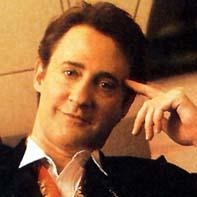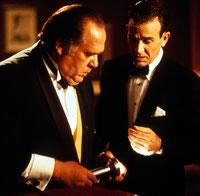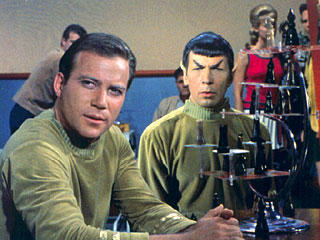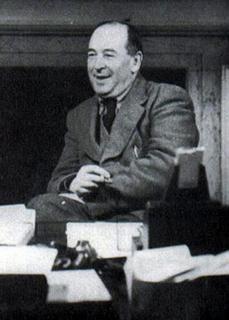All in all, I enjoyed it. It's got an incredibly weak ending. And an incredibly weak premise. It's threaded through with the kind of anti-Catholicism that is rather commonplace to American culture. And while I think Gabriel Bryne is an exceptionally handsome man (and makes an exceptionally handsome priest), he isn't my favorite actor in the world. The thing that makes the movie worthwhile is that it is visually gorgeous. It's one of those image heavy movies: kind of like watching a very long MTV video. (There's a movie called Streets of Fire which has, possibly, the dumbest dialog on record, but if you turn the sound off and just watch the scenery, it's fairly spectacular.)
Basically, a young girl in Philly is invaded by the ghost of a dead priest (why, I have no idea; I missed the first twenty minutes, but I didn't get the impression that they ever explained it) who discovered the missing Gospel of Jesus and wants the world to know. The priest is either crazy or the girl is also invaded by the devil, I'm not sure which (and they never tell you) because at one point, she starts screaming and throwing people around the room. ANYWAY, she begins to experience the stigmata, which is a real thing (in the sense that people really have and do claim to experience it); the stigmata are the wounds that Christ received on the cross.
A young priest shows up and sort of falls in love with the poor chick but doesn't sleep with her, which was an unexpected twist. And he finally commands the spirit of the dead priest to leave her alone which it does (which makes you wonder why he didn't do it earlier).
And while this rather vapid plot is unwinding, the audience is treated to eerie and atmospheric scenes of dirty subways and apartments filled
 with urns to catch water and white statues in a foggy garden (replete with doves) and lots and lots of rain. And it is very effective. Like watching a poem. I didn't feel, even with the rather non-climactic ending, that it had been a waste of time. Which sometimes I do feel with movies on TV.
with urns to catch water and white statues in a foggy garden (replete with doves) and lots and lots of rain. And it is very effective. Like watching a poem. I didn't feel, even with the rather non-climactic ending, that it had been a waste of time. Which sometimes I do feel with movies on TV. And then they spoiled it at the end by sticking in a little paragraph, right before the credits rolled, about the Gospel of St. Thomas, which the Catholic Church has refused to accept, even though all these other scholars have.
Now, I believe in Occam's Razor; the simplest solution is usually the right one. I'm also an optimist (on paper, anyway) which means that I believe the simplest, nicest solution is usually the right one. Which means that I start from the premise that the Catholic Church is not full of conspiracies, and that Catholic scholars, especially at the Vatican, are actually pretty good at their jobs.
It's a useful premise to start from. Remember, I'm a Mormon so I believe that by circa 70 A.D. (or C.E.), the Church of Jesus Christ had lost its original form, which was not restored until Joseph Smith did so in 1835. Sounds crazy. But that's what I think. Joseph Smith also preached that the Bible is "true, in so far as it is translated correctly." There are as many scriptural literalists in the Mormon church as there are in other churches, but, due to Joseph Smith's useful little caveat, they are a lot easier to debate.
My point is that Mormons have little investment in the tensions between the Gnostic gospel promoters and the Catholic Church. The Gnostic gospel promoters (and I mean here the theorists who believe that the Catholic Church suppressed the feminist Gnostic gospels and replaced them with the chauvinistic, patriarchal gospels of Matthew, Mark, Luke and John) and the Catholic Church are arguing over texts from about 150-200 A.D. (C.E.) and in particular over the Council of Nicea (325 A.D.), a period of time that Mormons tend to ignore (they skip right to the Reformation).
So my premise that the Catholic Church knows what it is talking about stems more from a bias in favor of institutions rather than an investment in the conclusion. I tend to trust conservative, traditional evaluations until I'm given some better reason than a conspiracy theory to drop them. Which means I think Matthew, Mark, Luke and John were probably picked because they were the best, if not the only, intact gospels available. On top of which, there is really no good reason, as far as I can see, to believe that the Gnostic gospels weren't equally chauvinistic and patriarchal (and some very good reasons to think that they were moreso).
So, I resented Stigmata throwing in their half-baked criticism of the Catholic Church. It took the movie out of its surreal/fantasy context and turned it into some kind of statement, and since, as I've mentioned, the plot was a bit stupid, it made a really stupid statement.
It harks back to the "show, don't tell" approach that teachers tried to pound into us in High School. Or, rather, the "show, don't pontificate" problem that so much art seems to stumble over. In his review of the movie Constantine, my brother Eugene wrote: "The reward, as I've mentioned, is that some small aspect of actual Christian theology eventually gets treated seriously and hammered out. Okay, hammered into a twisted wreck, but at least there's metal under the mallet." This is how I felt with Stigmata--it started with a legitimate Catholic concept with a lot of meat to it and great "hammering" potential. The mistake was for the writers to try to sermonize about THE CHURCH at the same time they were pushing all this radical imagery. The result was a dull thud.
Conclusion: If you're going to borrow heavily from Catholic theology, use it. Don't start to use it, and then inform the viewer that really this is all so pretentious and corrupt. It's rather like feminists who want women to be pro-active while telling them how victimized they are. Like, okay, choose already.





